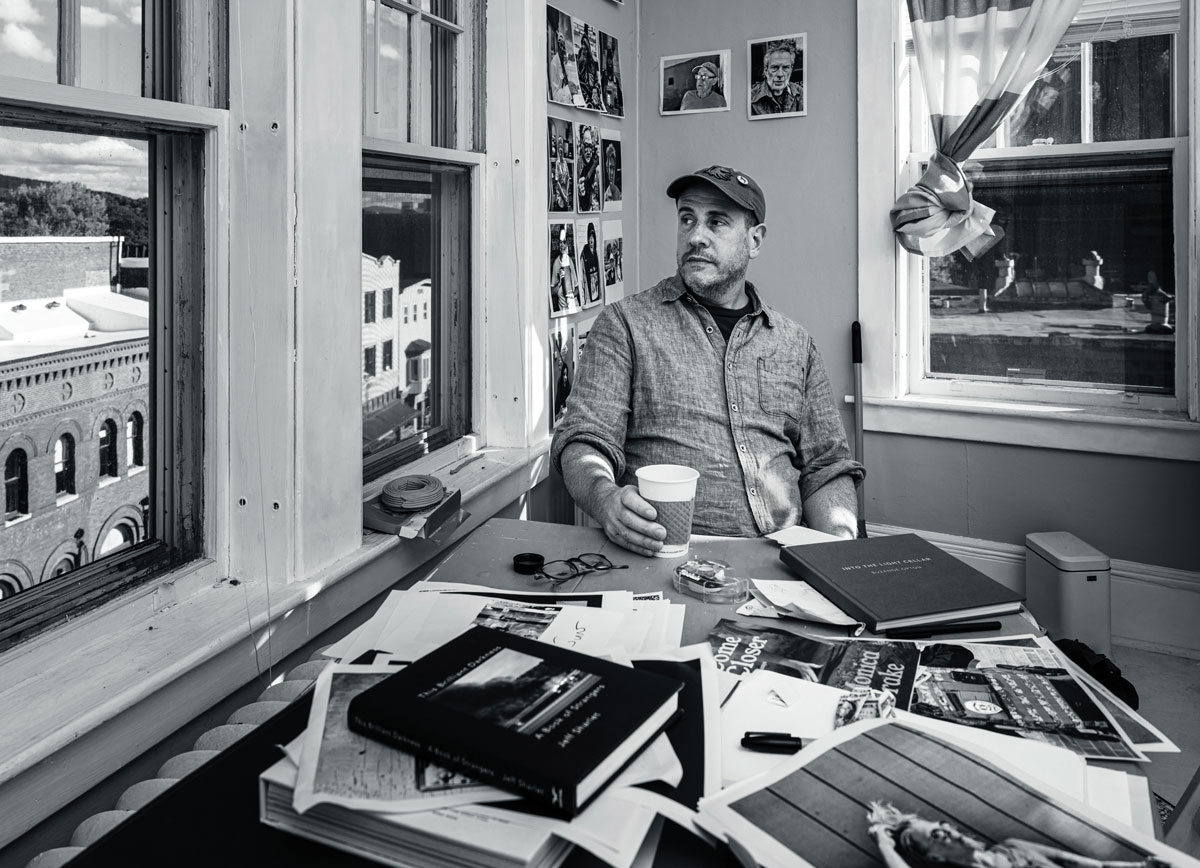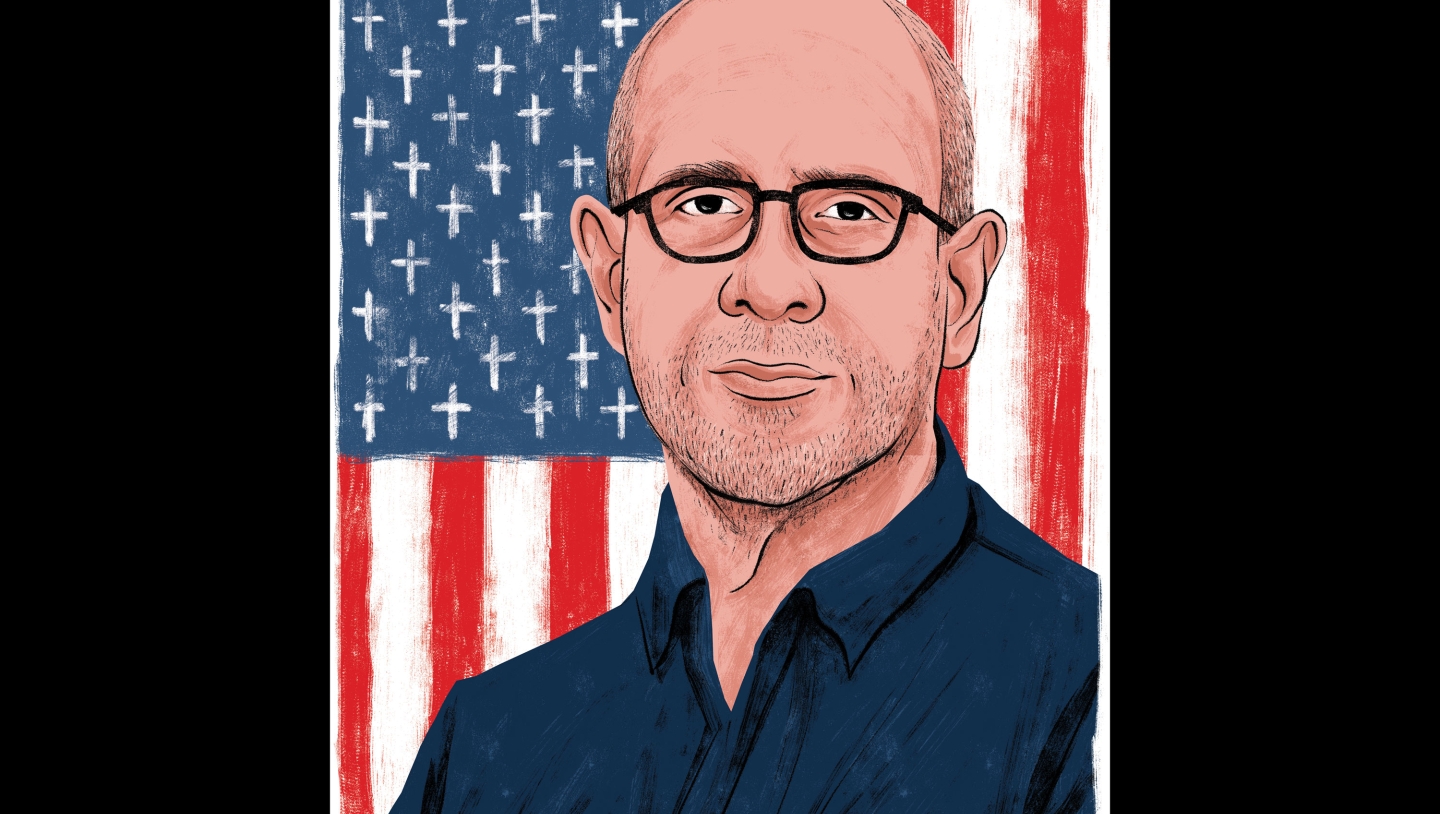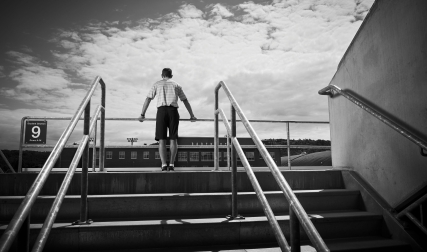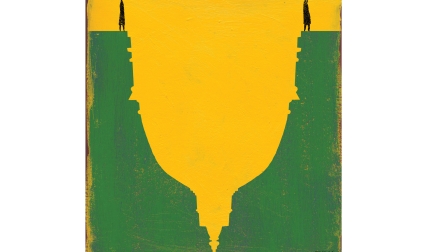Jeff Sharlet was in his Toyota Camry, getting ready for a Zoom interview with the left-leaning podcast Some of My Best Friends Are. He would be talking about his acclaimed new book, The Undertow: Scenes from a Slow Civil War, a collection of dispatches from his travels across the country to Donald Trump rallies, megachurches, and men’s rights conventions to document the symptoms of what he diagnoses as the rise of fascism in America.
Sharlet logged onto Zoom from his MacBook. His reflection stared back at him: a bald guy in his early 50s with salt-and-pepper stubble on his chin, wearing horn-rimmed tortoiseshell glasses. Sharlet, who lives in Norwich, Vermont, with his wife and two kids, has been a professor of creative writing at Dartmouth since 2010. He’s been immersing himself in the world of the religious right, for magazines such as Harper’s, GQ, and Vanity Fair, for two decades, and he has covered Trumpism as a kind of death cult, an apocalyptic faith whose adherents believe themselves to be engaged in spiritual warfare.
Sharlet himself is a devout skeptic, the son of a Jewish father, a Soviet Union expert who taught at Union College, and a Tennessee-born mother, who was raised Christian and embraced an evolving pantheon of deities and spiritual traditions. His desire to document humanity’s psychic fringes has led him into situations that most people with intact self-preservation instincts would endeavor to avoid.
Long before his work on “Trumpworld,” Sharlet spent a month at the northern Virginia compound of a secretive Christian nationalist group known as the Family, whose sphere of influence includes some of the most powerful people in the U.S. and foreign governments. That reporting led to his breakout 2008 book by the same name, which Sharlet suspects got him his teaching job at Dartmouth and, in 2019, became a Netflix documentary miniseries. He has traveled to Russia and Uganda to write about the brutal suppression of LGBTQ rights activists, for which he won a handful of national awards. He has hung out on Los Angeles’ Skid Row to piece together the life of a homeless Cameroonian man named Charly Keunang, who was shot and killed by police.
This reporting has taken a toll on Sharlet, in mind and body. In 2016, he was working at a frenetic pace, attending Trump rallies and watching the crowd rejoice at the future president’s pantomimes of rape and violence. Then, that fall, at the age of 44, Sharlet had two heart attacks, or maybe it was one, drawn out across several days. The doctors weren’t quite sure.
For a few years, he slowed down. But by 2019, he was back at the Trump rallies. As QAnon and other conspiracy theories seeped into the cosmology of the right-wing establishment, the material, for Sharlet, had become irresistible. “On one hand, I thought, I shouldn’t go near that,” Sharlet says. “On the other, I thought, Maybe it’ll be good for me. It’ll be invigorating.” That tension simmers throughout The Undertow: how badly Sharlet can’t look away.
His podcast interviewers, Khalil Gibran Muhammad and Ben Austen, appeared on the screen. “That’s a man who’s used to being on the road!” Austen said.

To minimize noise from outside, Sharlet kept his car windows closed. Forty-five minutes into the interview, the hosts asked Sharlet what he meant by “slow civil war.”
“The slow civil war that I imagine,” Sharlet caught himself, hearing the weakness of the word, “believe is happening right now—it’s not coming. People ask, ‘Could there be violence?’ and it always stuns me. What do you mean, could there be violence? There is already violence.” The fan in Sharlet’s MacBook started to wheeze. “Now, what has been a simmer is coming to, perhaps, a slow boil. And maybe what it looks like is the Troubles in Northern Ireland. Or maybe what it looks like is what we’re living through right now.”
Sharlet was talking here about the steady drip of mass shootings, “every pregnant person who’s dying for lack of reproductive rights right now,” and “the wave of queer and trans kids’ suicides,” all of which, Sharlet told his interviewers, should be viewed as fatalities of this slow civil war.
Since The Undertow’s release in March, Sharlet has been making these arguments frequently, on TV and radio shows and in print. He is not a historian or political scientist, nor does he write like one. Sharlet considers himself first and foremost a storyteller, and his main interest in The Undertow is how the dream, or nightmare, logic of Trump works upon individuals, warping their sense of reality until they come to see themselves as combatants in a battle they believe is upon them already.
“When I asked, civil war, when the believers answered, civil war, we were speaking in metaphors we could barely comprehend,” Sharlet writes. “We were describing a feeling that frightened or exhilarated us: a body coming apart.”
When Sharlet talks about his need to understand the fracturing of the American body politic, he often talks about his older child, who is nonbinary and struggling to cope with the daily violence against transgender people, and the fact that so far in 2023, 45 states have introduced or passed anti-trans legislation. In Sharlet’s school district, which serves Norwich and Hanover, a group of parents has been trying to repeal a policy that protects the privacy of transgender students. The parents aren’t fringe right-wing activists, Sharlet says. At least one of them went to Dartmouth, and their lawyer is the legal counsel for the New Hampshire Senate.
So Sharlet drives around with a bottle of aspirin in his cup holder, trying to figure out what the hell is going on. “I’m too anxious to do anything else,” he says. “This is what I can do, and it’s nowhere near enough.”
The Undertow is not the first book to detail the horrors of the “Trumpocene,” a phrase coined by Sharlet’s Dartmouth colleague, filmmaker Jeffrey Ruoff, but it might be the first to document them in lyrical prose. Most of The Undertow’s reviews have been positive, even reverent: The Washington Post called it “journalism-as-art.” The New York Times declared it “a riveting, vividly detailed collage of political and moral derangement in America, one that horrifyingly corresponds to liberals’ worst fears.”
Only the Los Angeles Review of Books was dubious, suggesting that Sharlet had fallen under the doomsday spell of the far right. “Projection is a powerful force; if not careful, Sharlet and others will metastasize an otherwise provincial development into an international global menace,” read one particularly spicy passage from religion scholar L. Benjamin Rolsky.
The Undertow is a book about anger, in particular white anger, bookended by two stories of hope. Sharlet begins with a chapter on the late singer and civil rights activist Harry Belafonte, whose rage fed his art and his political commitments. The final essay is a meditation on the life and resistance ballads of folk singer Lee Hays. In between, the anger Sharlet documents is the kind that devours as it claims to redeem.
He attends a rally in Sacramento, California, for Ashli Babbitt, the 35-year-old woman shot and killed by a U.S. Capitol police officer during the January 6, 2021, insurrection. He goes to a megachurch in Yuba City, California, where the pastor proclaims that Hillary Clinton has been executed and that Trump remains the current, and 19th, president, the other 26 all being “illegal.” At another megachurch in Omaha, Nebraska, an usher and an armed security guard catch Sharlet talking to people in the parking lot and tell him that he isn’t allowed to conduct interviews on church grounds. When Sharlet protests that he has only a pencil and the security guard has a gun, the usher leans in and asks him, “How do you know that I don’t have a gun?”
Sharlet’s writing sometimes takes on the hallucinogenic quality of his subjects’ delusions. In a chapter on a men’s rights conference in St. Clair Shores, Michigan (from a piece Sharlet reported for GQ in 2014), he writes: “We were high in the manosphere now, the great phallic oversoul, the red pills were working, the rape jokes no longer landing like bombshells, they were like the weather, ordinary as rain.” Sharlet had been drinking mudslides in a hotel room with the men’s rights activists—men, yes, but also some women—who believe that feminism has ruined their lives and made the world a dangerous place for men.
The GQ story infuriated the men’s rights activists. Michael Lesy, a writer and a mentor to Sharlet since Lesy taught him at Hampshire College, says the people with whom Sharlet embeds sometimes forget that his aims are not aligned with theirs. “He’s often in the middle of people who would be described as extreme in their beliefs, but they see him not as something to be feared, but someone to be converted,” Lesy says. “And in the end, when he writes the story, they feel betrayed.”
The men’s rights activists sent Sharlet hate mail and death threats and accused him of being a pedophile. For a few weeks, Norwich police cased Sharlet’s house in case anyone showed up to menace him.

Around this time, Sharlet says, he was slowly doing himself in. He slept about four hours a night and polished off whole bottles of Scotch while he wrote. “I wasn’t thinking, I should stop this,” he says. “I was thinking, I’m going to burn myself up.” Next he went to Skid Row to report the Charly Keunang piece for GQ. He spent weeks on the streets with the people who had known Keunang, people whose lives had been ravaged by severe mental illness and addiction. “I was very, very comfortable in that milieu,” Sharlet says. Extremity has always been clarifying to him. Sarah Khatry ’17, a former student whom Sharlet hired as his research assistant for the Keunang piece, watched him pour himself into the story. “When the work takes a toll on him, I think it has this paradoxical, but not actually paradoxical, result that it drives the work forward, pushes him to keep pushing,” says Khatry. “I don’t think he can write the way he writes, except that he reports the way he reports.”
Sharlet encourages his creative nonfiction students in his immersive reporting techniques. Recently, he got a late-night call from two students who were in Burlington, Vermont, to do a story about heroin. They’d met a dealer who needed to get to nearby Winooski, and they wanted Sharlet’s advice: Should they give him a ride? “Thank God the call dropped just at that moment, so I didn’t have to answer,” Sharlet says. “Because the answer, of course, is ‘Yes, you should totally go!’ ”
When Sharlet was deep in the Keunang story, he thought he could outrun, or outwrite, the reckoning with his own body. “The real danger is to make the mistake of absorbing all these stories as sequential, not cumulative,” he says. His heart attacks would soon teach him that, but first, there was Trump.
Sharlet felt media coverage of Trump’s 2016 presidential campaign was poor. “To say I felt an obligation is very pretentious. But the bar was so fucking low because the press was so goddamn stupid,” he says. “They just sit there in their pen. And when the preachers preach at the rallies, they look at their phones.” He wanted to write about the rise of Trump not as a political phenomenon, but a religious one. His first magazine story on Trump, published in The New York Times Magazine in April 2016 and included in The Undertow, was titled: “Donald Trump, American Preacher.”
He drove around and knocked on doors if he saw an interesting flag out front, which, to Sharlet, means anti-Biden, pro-Trump, pro-gun, pro-Nazi.
Narratively and physically, Sharlet doesn’t position himself above the fray when he is in the territory of the far right. He sweats and lurches with the rest of the crowd at Trump rallies, the better to see his followers’ ecstasy. In these situations, Sharlet has the indisputable good fortune of being white, male, and bald—nerdy enough to appear harmless, goonish enough to discourage people from messing with him. When he talks to neo-Nazis and white supremacists, he says, they tend to assume a kind of sympathy, even as he makes no secret of his disagreement with them, because they, too, see themselves as outsiders, persecuted seekers of a higher truth.
“Jeff doesn’t pretend to have opinions he doesn’t have,” says writer Blair Braverman, who accompanied Sharlet on several reporting trips for the pieces in The Undertow. “But he does it in such a way that people feel seen, and they tell him all sorts of things that you wouldn’t expect them to say. There’s just something disarming about him.”
Sharlet’s preferred journalistic method is talking to strangers. For a few of the stories in The Undertow, he drove around and knocked on doors if he saw an interesting flag out front, which, to Sharlet, means anti-Biden, pro-Trump, pro-gun, pro-Nazi. In a chapter on Marinette, Wisconsin, Sharlet walks up to a house with a “Fuck Trudeau” flag. A man named Rob Brumm invites him inside after determining that he is neither a fed nor an intruder, but “a fool.” On a pool table in Brumm’s living room lies a massive pile of guns. In the midst of the guns—somehow even more unbelievable—is a cat.
Brumm, who claims he participated in the January 6 attack on the U.S. Capitol and that January 6 was a hoax, is Sharlet’s ideal subject: someone who contains irreconcilable multitudes, whose sense of the world is shaped by an esoteric logic. Sharlet gravitates toward the details of his subjects’ lives; in his essay on Ashli Babbit, he writes about her love of The Big Lebowski, her financial woes, the girlfriend she and her husband shared. “There are plenty of people who would say, ‘Why are you platforming her?’ or ‘You’re humanizing her,’ and I just think that’s stupid,” he says. “I can’t humanize her. She’s already human.”
Sharlet hates the phrase “common ground.” He doesn’t believe that if he spent enough time with, say, the Hanover parents who want to repeal the school district policy that protects trans kids, they might discover some shared principle that zeroes out their differences. “We’ve made different choices,” he says. “We are not the same.” But he wants his students to take a slightly less binary view of the world, to examine their resistance to being curious about people who, in some respects, are perhaps not so unlike them. “What’s scary about a monster—a werewolf, a vampire—is that it’s part human,” Sharlet says. “That you are on a spectrum with it.”
Sharlet likes to read his subjects like tarot cards—they mean one thing if you look at them one way, something else if you turn them upside down. Searching for material is his basic condition, of which books are sometimes a consequence. “You can’t walk down the street with him, because you’ll lose him,” says the writer Quince Mountain, a longtime friend of Sharlet’s. “He’ll just start talking to Nazis or taking pictures.” Sharlet’s next book is supposed to be about books that never got finished. But naturally, he doesn’t want to finish that book. Instead he wants to do a book called Other People’s Churches, an idea that came to him last summer in Milwaukee, Wisconsin, where his oldest kid was in a mental health treatment program. As Sharlet wandered around the city, he said, he couldn’t help but notice all the churches with boarded-up windows, churches that stood only because it would be too expensive to bulldoze them.
“That’s the undertow of The Undertow—this question of grief and mourning,” he says, meaning his grief and mourning, over his kid and the state of the world. “I don’t find my hope from light, airy places.”
Near the end of last spring semester, Sharlet’s creative nonfiction class was workshopping a piece about a student’s undercover visit to a crisis pregnancy center. In the story, the writer recounted how vulnerable she’d felt as the crisis pregnancy counselor asked her about her life and her relationships. One of Sharlet’s students suggested that the writer could be even more vulnerable, go deeper into the messy soup of emotions and self-doubt she’d hinted at in the piece. But if the writer would feel too exposed, the student added, she shouldn’t do it. “I don’t want to tell you to do something you’re not comfortable with,” she said. “We’re all trying to figure this stuff out.”
Sharlet thought this raised an important point about the inherent conflict of first-person nonfiction writing, the dueling impulses to be seen and to be invisible on the page. At the start of the class, he’d quoted the famous opening lines of Janet Malcolm’s The Journalist and the Murderer: “Every journalist who is not too stupid or too full of himself to notice what is going on knows that what he does is morally indefensible. He is a kind of confidence man, preying on people’s vanity, ignorance, or loneliness, gaining their trust, and betraying them without remorse.” Sharlet felt Malcolm was too dark in her idea that revelation was necessarily betrayal. But here was an interesting corollary.
“I never thought about Malcolm in this context, that you have your own relationship with yourself, that you can betray yourself. Literally, think of the word betrayal—to cross over, to portray to another person. Betrayal is always a kind of vulnerability,” Sharlet told his students. “But if you can’t, if it hurts too much, don’t do it. Try and stay intact so that you can tell more stories.” It was sound advice, advice Sharlet himself would not have taken.
Chelsea Edgar is a former staff writer for Seven Days, a Vermont weekly. A version of this piece previously appeared in that publication.




